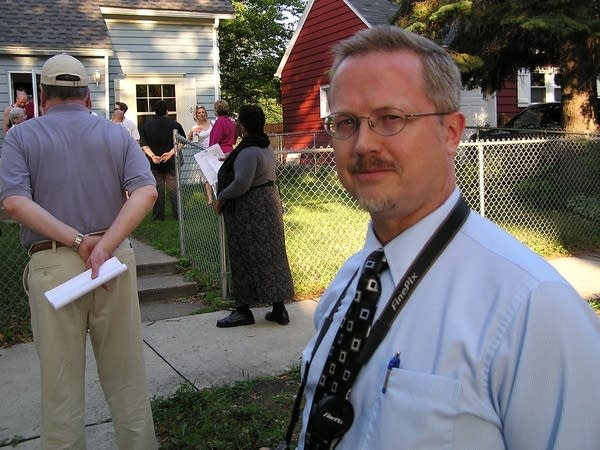Foreclosure crisis recovery in Minneapolis to cost millions
Go Deeper.
Create an account or log in to save stories.
Like this?
Thanks for liking this story! We have added it to a list of your favorite stories.

A picture-perfect summer evening of sunshine and mild temperatures greeted people attending the tour in Minneapolis' Camden neighborhood.
It was almost as though the pleasant weather was the calm after the storm. The storm in this case is the mortgage foreclosure crisis that has lashed many north Minneapolis neighborhoods.
The picture is uneven. Some blocks have many foreclosed homes that are boarded and vacant. Others including the block Camden that hosted the tour, have not been hit as hard.

A good number of the empty homes are in limbo as the foreclosure process drags on. A handful have been rescued. One of them is a Cape Cod- style home at 3910 Dupont Ave. N., with a new roof, new kitchen, fresh paint and lots of other improvements.
Turn Up Your Support
MPR News helps you turn down the noise and build shared understanding. Turn up your support for this public resource and keep trusted journalism accessible to all.
The Minneapolis-based Greater Metropolitan Housing Corporation is the nonprofit behind the rescue. Most of GMHC's more than $20 million has been loaned to them by public and private sources and must be paid back.
GMHC director of special projects Stephanie Gruver says they're using the money to buy, in some cases demolish, and in others rebuild and eventually sell, foreclosed homes mostly in north Minneapolis.
"Althogether we've purchased 75 properties," Gruver says. "Some of those properties will be transferred to other entities helping with the redevelopment effort. Most of our houses will be for sale in the $150,000 range or less."

Market forces pairing sellers with buyers will work in many neighborhoods to clear the surge in homes caused by mortgage foreclosures.
However some Minneapolis neighborhoods have blocks where every street has several boarded and vacant homes. North Minneapolis homeowner Jeff Strand says buyers and other investors are wary of risking their money where the scene is so bleak.
Strand, who leads Hennepin County's foreclosure prevention and recovery effort, says those neighborhoods need more help moving properties than the market can muster.
"In certain areas where you had the combination of predatory lending, very targeted aggressively towards the working poor and oftentimes new immigrants and minority populations that I think our areas like Camden and near need the extra boost," he says.
North Minneapolis neighborhood activists argue the targeted populations include single African- American women who are heads of their household.

That's also the finding of a recent Consumer Federation of America study.
The Federation's Allen Fishbein, says they found that a disproportionate number of African- American women were sold toxic, subprime loans that eventually led to foreclosure because they didn't ask as many questions about the deal.
"Women on the whole... are more uncertain of their level of financial knowledge and also less likely to negotiate in business situations," he says. "One of the secrets of mortgage lending is that rates and points and fees on any given day that a broker or a lender offer, are negotiable," he says.
One of the people on the tour, north Minneapolis homeowner and neighborhood resident Laine Bergeson, says she is of two minds on how much public money should be used to help neighborhoods recover.

Bergeson says many borrowers who got into trouble and were foreclosed on, knew the risks and bear the responsibility for the loans they bought. On the other hand Bergeson says she doesn't want whole neighborhoods to suffer.
"I feel in a way both parties knew what they were getting into... I'm an advocate for help for the neighborhood because in a way it's not the neighborhood's fault," she says.
Some experts say the mortgage foreclosure crisis has peaked. Others say it will be at least another year before it runs its course.
Congress has approved a $300 billion rescue package that President Bush promises to veto.
Federal and state agencies are exercising more of their regulatory muscle to try rein in the behavior that led to the crisis.
In north Minneapolis and a handful of other cities around the country advocacy groups and neighbors aren't waiting.
They've started a recovery effort that will take years and untold sums of money to accomplish.





